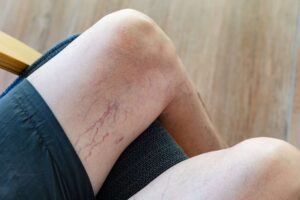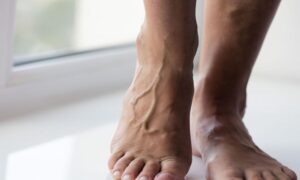| Varicose vein prevention is a multi-pronged approach. Diet plays a key role, with certain foods rich in vitamins and essential fatty acids promoting better circulation and vein health. However, genetics and lifestyle factors can also contribute. If you’re concerned about varicose veins, Miami Vein can help. Our team of specialists offers minimally invasive treatments and personalized plans to keep your legs healthy and strong. Schedule a consultation with Miami Vein today! |
Are you tired of varicose veins making you feel like you have to hide your legs? But those unsightly veins are also more than just a cosmetic concern. They can cause discomfort, and pain, and even lead to more serious health problems.
But the good news is, you can take control of your vein health and prevent varicose veins from forming with a little help from your diet. This blog unveils the top 5 power players in the fight against varicose veins.
From leafy greens to fatty fish, discover delicious and nutritious foods that can promote better circulation and keep those veins strong. If you’re ready to ditch the self-consciousness and embrace healthy, beautiful legs, let’s dive in!
What Are Varicose Veins And What Causes Them?
Varicose veins are enlarged, twisted veins that are commonly found in the legs and feet. They occur when the valves in the veins are weakened or damaged, causing blood to pool and the veins to become swollen and twisted. Varicose veins can be caused by a variety of factors, including:
- Genetics: If varicose veins run in your family, you may be more predisposed to developing them due to weaker vein walls or valves.
- Pregnancy: The increased blood volume and pressure on the veins during pregnancy can strain them and lead to varicose veins.
- Obesity: Excess weight puts extra pressure on the veins, especially in the legs, increasing the risk of varicose veins.
- Standing or sitting for long periods: This can impede blood flow and cause blood to pool in the veins, which can contribute to varicose veins.
Why Is It Important To Prevent Varicose Veins?
Prevention is always better than cure and because varicose veins are often a sign of a more worrying underlying condition, treating them is necessary but prevention is ideal. Preventing varicose veins is important for several reasons:
- Varicose veins can be unsightly and may cause self-esteem issues for some people.
- They can cause discomfort and pain, including aching, heaviness, and cramping in the legs.
- If left untreated, varicose veins can lead to more serious complications, such as ulcers or blood clots.
By following a varicose vein prevention diet and making healthy lifestyle choices, you can reduce your risk of developing varicose veins and improve your overall leg health.
Leafy Greens and Vegetables
Leafy greens and vegetables are excellent choices for promoting vein health and preventing varicose veins. These foods are rich in vitamins, minerals, and antioxidants that can help strengthen the veins and improve blood flow.
Examples of leafy greens and vegetables that are beneficial for varicose vein prevention include spinach, kale, broccoli, Brussels sprouts, and bell peppers. These foods can be enjoyed in salads, stir-fries, smoothies, or as side dishes.
1. Berries and Citrus Fruits
Berries and citrus fruits are packed with antioxidants and vitamin C, which can help improve blood circulation and strengthen the veins.
Blueberries, strawberries, oranges, grapefruits, and lemons are all great options to include in your varicose vein prevention diet. You can enjoy these fruits as a snack, in smoothies, or as part of a fruit salad.
2. Nuts and Seeds
Nuts and seeds are rich in essential fatty acids, fiber, and antioxidants, all of which contribute to better vein health.
Almonds, walnuts, flaxseeds, chia seeds, and sunflower seeds are excellent choices for varicose vein prevention. You can incorporate these foods into your diet by adding them to salads, yogurt, and oatmeal, or enjoying them as a snack.
3. Whole Grains
Whole grains are a great source of fiber, which can help prevent constipation and improve blood circulation.
Examples of whole grains that are beneficial for varicose vein prevention include whole wheat bread, brown rice, quinoa, and oats. These foods can be enjoyed as part of a balanced diet and can be included in meals such as salads, soups, or stir-fries.
4. Fatty Fish
Fatty fish, such as salmon, mackerel, and trout, are rich in omega-3 fatty acids, which have anti-inflammatory properties and can help improve blood flow.
Including fatty fish in your varicose vein prevention diet can promote healthy veins and reduce the risk of inflammation. You can enjoy fatty fish by grilling, baking, or steaming it as a main course or adding it to salads or wraps.
Treatment Options for Varicose Veins
While a varicose vein prevention diet can help reduce the risk of developing varicose veins, it is important to note that it may not completely prevent them. If you already have varicose veins or if you develop them despite your efforts, there are treatment options available.
A. Sclerotherapy
This vein treatment involves injecting a solution directly into the varicose vein, causing it to shrink and collapse. Over time, the body reabsorbs the treated vein.
- Quick and relatively painless procedure, often performed in-office.
- Effective for smaller varicose veins.
- Minimal downtime.
B, Laser therapy
This vein treatment uses laser energy to heat and damage the wall of the varicose vein, causing it to seal shut. The body then reabsorbs the treated vein.
- Precise and effective option for small and medium-sized varicose veins.
- Minimal discomfort and scarring.
C. Radiofrequency ablation
This procedure uses radiofrequency energy to heat the inside of the varicose vein, causing it to shrink and close.
- Versatile treatment for various vein sizes.
- Long-lasting results.
- Minimal downtime.
It is recommended to consult with a healthcare professional to determine the most suitable treatment option for your specific condition.
Take Control of Your Leg Health: Schedule a Consultation with Miami Vein Today!
Now that you’re armed with knowledge about preventing and treating varicose veins, it’s time to take action! At Miami Vein, our team of experienced vein specialists is dedicated to helping you achieve healthy, beautiful legs. We offer a variety of minimally invasive treatment options to address varicose veins and improve your circulation.
Schedule a consultation today to discuss your individual needs and explore the best path to a healthier you. Don’t wait to ditch the discomfort and self-consciousness – contact Miami Vein today and reclaim your confidence!
Frequently Asked Questions
1. Can exercise help prevent varicose veins?
Yes, regular exercise, especially activities that promote leg movement, can help improve blood circulation and reduce the risk of varicose veins.
2. Are there any foods that should be avoided for varicose vein prevention?
While there are no specific foods that should be completely avoided, it is recommended to limit the intake of processed foods, sugary snacks, and foods high in sodium, as they can contribute to inflammation and poor circulation.
3. Is it necessary to wear compression stockings for varicose vein prevention?
Wearing compression stockings can help improve blood flow and reduce the risk of varicose veins, especially for individuals who spend long periods of time standing or sitting. It is advisable to consult with a healthcare professional to determine if compression stockings are necessary for your specific situation.

John W. Dr. Chang, MD, serves as the Partner and Medical Director at Miami Vein Institute, a premier center specializing in vein treatment in South Florida. With a focus on providing high-quality care and ensuring patient safety and satisfaction, Dr. Chang has helped establish Miami Vein Institute as a leading destination for minimally invasive vein treatments. At Miami Vein Institute, Dr. Chang offers a comprehensive range of minimally invasive procedures, including Endovenous Laser Treatments (EVLT) and Sclerotherapy, to address various vein-related concerns. His expertise in both general and cosmetic surgery, combined with specialized training in vein treatments, allows him to tailor treatment plans to meet each patient’s individual needs. Dr. Chang’s commitment to excellence is reflected in his meticulous attention to detail and dedication to staying updated with the latest advancements in vein care technologies. He is certified in a wide array of cosmetic surgery procedures and is a certified trainer for various advanced techniques. Dr. Chang’s affiliations with prestigious medical associations underscore his commitment to upholding the highest standards of medical excellence. With a focus on patient well-being and personalized care, Dr. Chang ensures that every patient receives honest, expert guidance throughout their treatment journey. His passion for providing the best possible care is evident in his commitment to patient satisfaction and achieving optimal outcomes.


